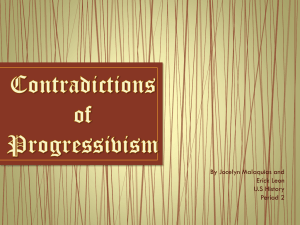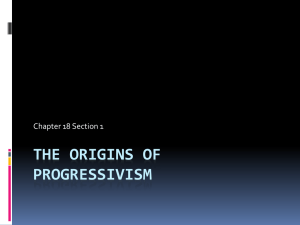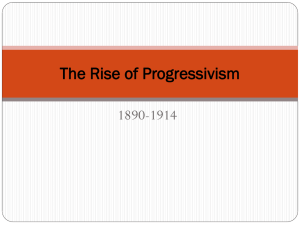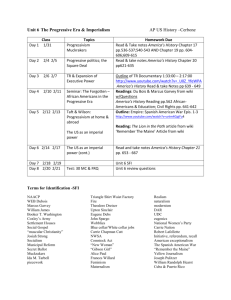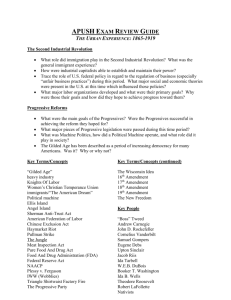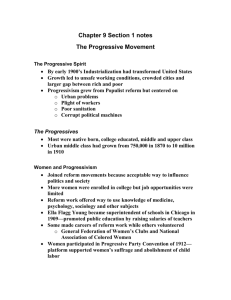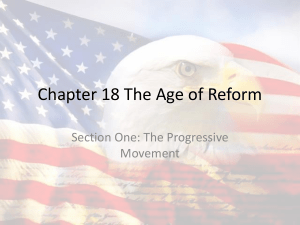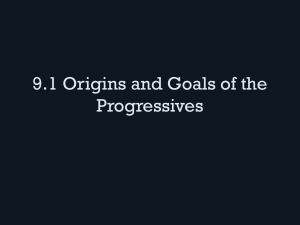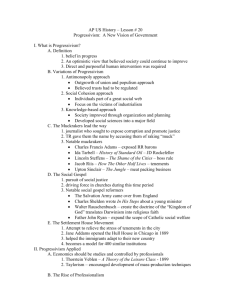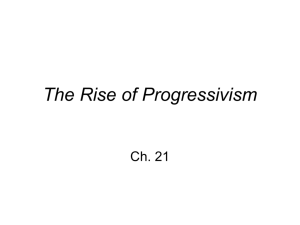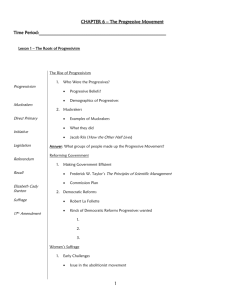Lecture 8: The Progressive Era, 1901-1917
advertisement
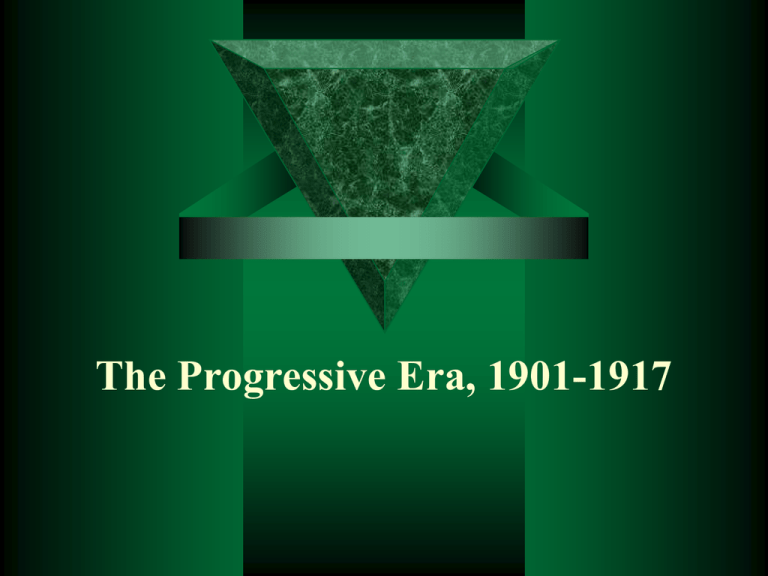
The Progressive Era, 1901-1917 The Progressive Movement: Definition and Character Goals – Political - Revitalize American Democracy • Make government responsive to people not special interests or bosses – Economic - Restore equity and opportunity to American capitalism – Social - Provide social justice to the poor Progressive Philosophy – Did not believe in radical change (socialism) – But wanted fair competition and worker regulation Operated on all levels of government Included both democrats and republicans. Composition Middle Class White Americans Farmers and Small Businessmen Social Reformers Professors & Lawyers Not included: Racial Minorities, new immigrants, Labor Unions Middle Class White Americans Wanted to restore honesty and integrity to government – They wanted to end corruption at all levels. • Elimination of political machines • Institute civil service reforms – End special interest lobbyist in legislative bodies Farmers and Small Business People who wanted to use the government to regulate the abuses of corporations and trusts – Wanted trusts eliminated – Wanted government controlled railroads rates and banks – Currency reform Had some success – but not enforced – Republicans embraced laissez-faire economics – Interstate Commerce Act – Sherman Anti-Trust Act Social Reformers Government should alleviate social problems – Slums and tenements Unsafe working conditions & child labor Treatment of new immigrants Some small scale success – Jane Addams (Hull House – Chicago) Included Professors, Lawyers and Social Gospel Advocates The industrial revolution brought on the need for corporate lawyers – Law was once a respected profession – Paid well to defend the interests of their company – Lawyers felt they were losing there identity Intellectuals – Use University professors to make the society more efficient – Wealthy men – donate to Universities • in return - donor had expectations for curriculum – Many intellectuals were concerned about this What Really Got Progressivism Moving? Teddy Roosevelt’s Assumption of the Presidency in 1901 – William McKinley is assassinated in Sept. 1901 – Youngest president at 43 years old – Gradually provided a national focus on Progressivism Rise of the ‘ Muckrakers” Muckrakers “Investigative journalism” Sensationalized Exposes on corporation corruption – Raised awareness Magazines – McClure’s, Cosmopolitan Ida Tarbell (1902) does and expose in McClure’s on Standard Oil – Illegal Monopoly Novels – The Octopus by Frank Norris – The Jungle by Upton Sinclair – How the Other Half Lives - Jacob Riis The Muckrakers formula is… – Uncover a scandal – Attack it using facts to back up arguments – Has a tremendous impact on readers Achievements of Progressivism Many political machines are overthrown – The Shame of the Cities – Lincoln Steffens – said political machines serve their own interests and that of corporations, not the people – Thomas Nast Leader of Progressive reform is Wisconsin 1900-01 – Robert LaFollette – Reduce gov’t corruption: Institutes the referendum, recall, primaries – Corrupt political practices acts passed – controls on campaign spending and lobbying – The universities must aid the state economists - come up with an effective tax system, highway system. – Child Labor Laws (one of the first states) – Building codes & controlled hours Thomas Nast & Harper’s Weekly Amendments to the Constitution The 16th Amendment – 1913 – Constitutional for the government to impose a personal income tax. The 17th Amendment – 1913 – Senators must be directly elected in a popular election. The 18th Amendment – Jan 1919 – Prohibition – Illegal to buy, sell or distribute hard spirits in the US. The 19th Amendment – 1920 – Prohibited states from denying women the right to vote. • Women did vote in certain states prior to this (In NJ in the late 1700s for a short time. • Also, some western states allowed women to vote) Contradictions of Progressivism Generally oppose political and social equality for racial minorities and recent immigrants Many Progressives Oppose Women’s Suffrage – Woodrow Wilson was one of these guys. He felt it was a state, not a national issue. Many Progressives Oppose National Labor Unions – Concerned about the plight of the working man, but at the same time opposed unions – Fear of Marxism – union leadership advocated changes that were too radical – Fear of radical uprisings Many Progressives Support Tighter Immigration Restrictions
